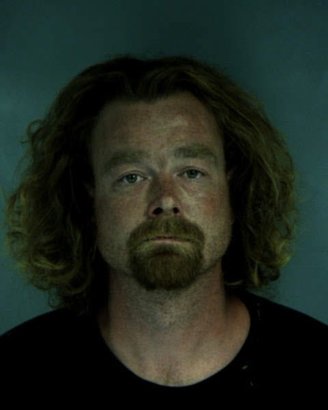Last week, visiting Judge Graham Cribbs upheld a jury’s decision to convict Jon Goldberg — a Bridgeville man accused of shooting down his wife’s lover in Fortuna, in broad daylight — of murder.
The jury convicted Goldberg back in March, but another hearing pertaining to the case was held last week, after attorneys unearthed some evidence of juror misconduct in Goldberg’s original trial. At the end of the hearing, Judge Cribbs dropped a weapons enhancement that would have lengthened Goldberg’s sentence, but he let the murder conviction stand.
The Public Defender’s Office isn’t happy about this, and last last week it the unusual step of issuing a press release that described the juror misconduct in detail, and furthermore hinted that Goldberg might take the case to the appellate court.

Press release from the Public Defender’s Office:
On October 19, 2018 Judge Graham Cribbs, a visiting judge from Riverside County, denied a Defense motion for a new trial. Judge Cribbs heard testimony from ten jurors, heard argument from counsel from both parties, and made a ruling denying the defense motion for a new trial, all in closed court. The defense repeatedly objected to the proceedings being conducted in closed court.
The issue before the court was whether jury misconduct occurred during the deliberation process. Specifically, there was conclusive evidence that the foreperson in the case discussed his prior experience serving as a juror on a murder case. He discussed that the defendant in that prior case was convicted of first degree murder, but only served eight years in state prison. He then went on to state that in California criminal defendants only do half of their sentences and that Mr. Goldberg would only do half of whatever he was sentenced to. The statement made by the foreperson, which is a gross misstatement of the sentencing laws related to murder, was particularly aimed at a juror who at the time of the statement was considering voluntary manslaughter over murder as the appropriate verdict. That juror ultimately voted for second degree murder rather than manslaughter.
The sentencing discussion undoubtedly amounts to jury misconduct, as it is one of the golden rules of jury deliberation that the jurors are not to discuss or consider sentencing or punishment during deliberations. Defense counsel believes, and it was argued before Judge Cribbs, that it takes no stretch of the imagination to understand how a person could succumb to pressure to vote for murder over manslaughter, upon being told that the sentence for murder is signi?cantly lower than he/she believed. Despite the conclusive evidence that this misconduct occurred, the defense motion was nonetheless denied.
It is one of the bedrock principles of our criminal justice system that every defendant is entitled to twelve fair and impartial jurors who all individually render their verdict based solely on the evidence presented in the courtroom and not on any extraneous information, such as grossly inaccurate misinformation about the length of the sentence attached to the charge. The remedy when the verdict is not based solely on the evidence presented is a new trial.
The defense in this case objected to the hearing on the motion for a new trial being held in closed court. The objection was based on the belief that one of the primary reasons we have open courts is to ensure transparency in our system, and that transparency is essential to the protection of due process. Unfortunately, the public did not get to see any part of a proceeding in this case that dealt with a crucial aspect of due process, the right to a fair and impartial jury.
The decision denying Mr. Goldberg’s motion for a new trial is subject to appeal.
###
PREVIOUSLY:
- NEW TRIAL? Goldberg Could Get New Hearing After Judge Determines There Was Jury Misconduct During Original Murder Trial
- GUILTY: Jon Goldberg Convicted of Second-Degree Murder in 2016 Fortuna Slaying of Firefighter Tim Smith
- Jurors From Goldberg Murder Trial Will Be Subpoenaed Over Misconduct; Retrial Could Be Ordered
- Fortuna Murderer Denied New Trial, Sentenced to 15 Years to Life
CLICK TO MANAGE